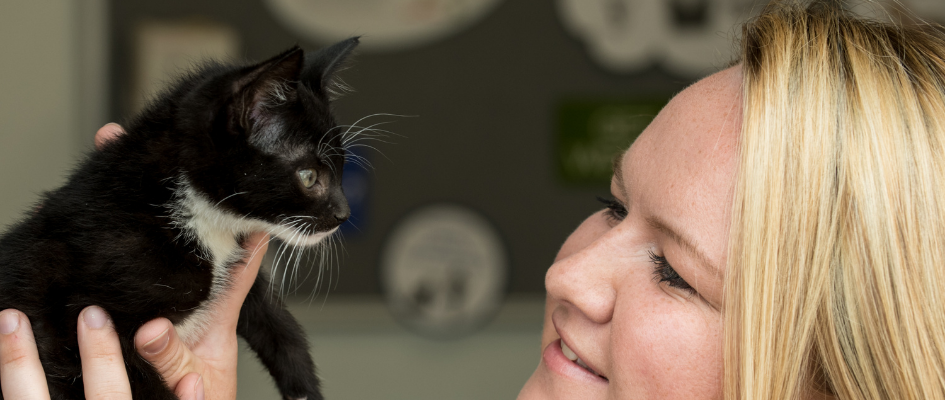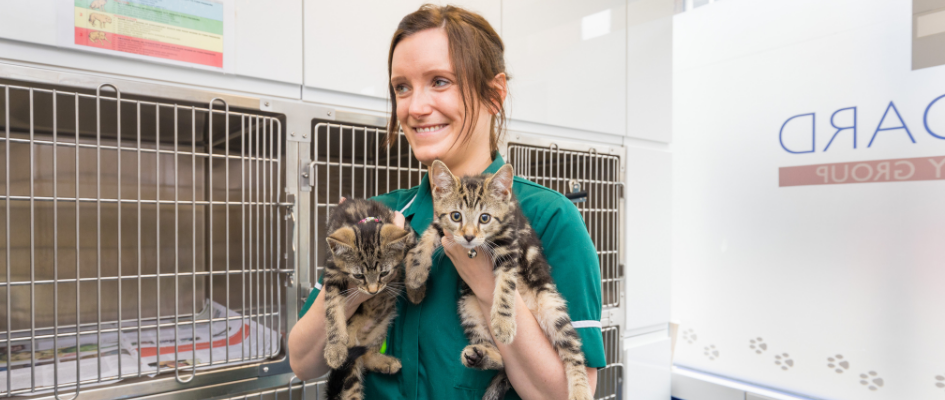We’re delighted to welcome you and your kitten ahead of their first vaccination appointment and health check. We thought it would be useful to give you an idea as to what to expect at your appointment so you can prepare any questions you would like to raise with your vet in advance. If you have any questions before then though, you are welcome to phone us in practice and we’d be delighted to help.
Bringing your kitten to your appointment
Please bring your kitten in a clean cat carrier that your kitten is familiar with an absorbent lining and some bedding that smells of your kitten and home. For hints and tricks to making travel and vet visits more comfortable for your cat, see our blog below.
What will happen at the appointment?
1. Full health assessment
After welcoming you both, your vet will first ask you some questions and make full clinical examination of your kitten.
They will ask you details about their eating and toilet habits as well as how active they are in order to better understand how your kitten developing and to help identify any areas of concern.

2. Vaccinating your kitten
If your kitten has not yet had its first vaccine…
- Your vet will administer your kitten’s first vaccination. This will protect against four important diseases: Feline Calicivirus, Feline Herpes Virus, Feline Panleucopenia Virus and Feline Leukaemia Virus.
- Your kitten will be given two vaccine doses, the second of which will be three to four weeks after the first. Kittens will need to be at least 12 weeks old at the time of the second vaccine.
- Due to the high cat population density in London, we recommend that kittens are kept indoors until they are old enough to be neutered (around four months of age) and until four weeks after their second vaccination when they will have maximum protection.
If your kitten has already had its first vaccine elsewhere…
-
-
We use Nobivac® vaccinations. Please let us know before your appointment, by emailing us a copy of the vaccination certificate if your kitten has had its first vaccination elsewhere. The brand of vaccination and the timing of that vaccination will influence when we need to see you, and what vaccinations your kitten will need.
-
Yearly boosters
-
-
A yearly booster will be needed to ensure protection against these diseases is maintained. We’ll remind you via email or text when your kitten’s annual booster jab and health check is due.
-
Will it hurt?
-
-
In the majority of cases kittens will not even notice the injection. Sometimes it may cause a sting or discomfort at the time of injection that will make your kitten wriggle or cry out. You may notice a small swelling at the site of injection and this can occasionally be hard or painful to touch for 3 days.
-

3. Healthcare Advice
At your appointment your vet or nurse will talk with you about a number of common healthcare- related considerations to help you make the best choices for your kitten. These will include:
Parasite Control
- If your kitten has already had flea or worming treatment given by the breeder or yourself, please bring details of what product was used and when it was given, to your appointment.
- Kittens are very susceptible to the effects of worm and flea infections and adult cats also require regular worm and flea control to prevent serious illness, poor health and to keep your family safe.
- At the appointment your vet will assess your kitten’s health, weight and lifestyle and will recommend a regular program of both treatment and prevention.
- The most effective parasite treatments are often only available by veterinary prescription. We don’t recommend over-the-counter products or online products bought without a veterinary assessment and weight check.
Neutering
-
We advise neutering of kittens from 4 months of age, and once your kitten is fully vaccinated.
- Queens (the girls): In females, the procedure is called Spaying. This involves a general anaesthetic and a clipped patch surrounding a small incision (perhaps 1cm long) on one flank through which the ovaries and uterus are removed.
- Toms (the boys): For tomcats, the procedure is called castration, and involves surgical removal of both testicles. Once under anaesthetic, the vet will pluck the hair from his scrotum (“ball sack”) and then make two small incisions in it, one on each side.
Microchipping
-
We advise microchipping of kittens at either time of vaccination or at time of neutering. There is currently no legal requirement for cats to be microchipped, but this is due to come into force in the near future. If your kitten has already been microchipped by your breeder, please make sure you contact the microchip company to have the registered contact details changed to your details.
ProActive Pets
- Goddard Vet Group offers its own preventative healthcare plan which means you can save money on the cost of routine vaccinations and flea and worm treatments as well as spreading payments for them throughout the year by direct debit.
- As well as saving at least 21% on the costs of vaccines and parasite control, you’ll also benefit from extra discounts on pet food, neutering, dental treatments and over-the-counter purchases at your practice. It also includes the cost of microchipping.
- Ask us when you come into your appointment should you wish to join or to find out how much more you could save. You can sign up in practice on the day of your kitten’s vaccination to take advantage of an immediate 30% discount. You may of course decide to join at any time you wish, though discounts will only apply from the date that you start your membership.
Insurance
- We recommend that you consider pet insurance to cover unexpected sickness or injury which can be costly. (This is different to preventative healthcare which is not insurance).
- If you’ve not already organised pet insurance, ask us at your appointment about setting up an initial 4 weeks of free cover once the vet has assessed your kitten to be fit and healthy and free from pre-existing conditions.
- Should you wish, we can pass your details to a pet insurance provider to provide your kitten with an immediate temporary four-week insurance policy.
- The company can provide information about its policies which you are under no obligation to take up. Activating this free insurance can help cover the cost of unexpected veterinary treatment during this period and give you peace of mind whilst you decide which, if any, policy or insurance company is best for you.
Nutrition
- We would advise a good quality complete kitten food such as the Royal Canin range which is stocked in our practice. If your breeder has given you food, and you would like to change to a recommended food, then you should do so gradually, over the course of about seven days. Be careful with the treats that you are giving as some may not be suitable for kittens and can cause diarrhoea.
- Do not give your kitten human food.
- We recommend feeding a mix of wet and dry food. Cats should eat little and often.
- It is important that they always have access to clean, fresh water and they prefer water to not be located next to their food so leave bowls of water around the house for easy access.
Understanding your cat and everyday care
- Thanks to the hard work of committed cat lovers and feline specialists around the world we now have a much better understanding of cats, their behaviour and their environmental and healthcare needs than we did even just a few years ago.
- Icatcare.org is an excellent source of information to you get you started on providing a safe and happy home for your new kitten and we are our proud that all Goddard Veterinary Group practices are members its sister organisation the International Society of Feline Medicine.
- Whilst your kitten is young it is the best time to get him/ her used to being handled. Dental problems or problems with their coat commonly affect cats later in life, so starting care early on can certainly be beneficial.
- The following link gives more information on how to look after your cat’s everyday health, including tooth brushing.
